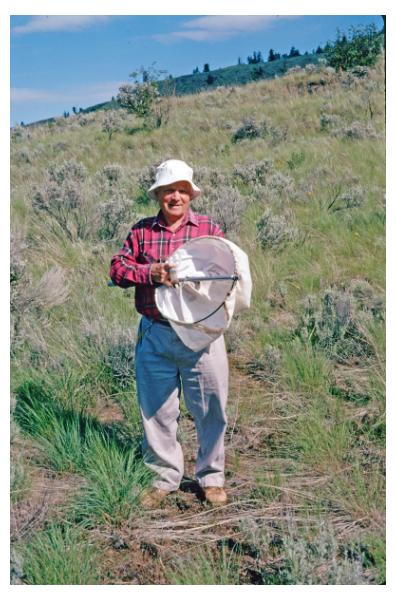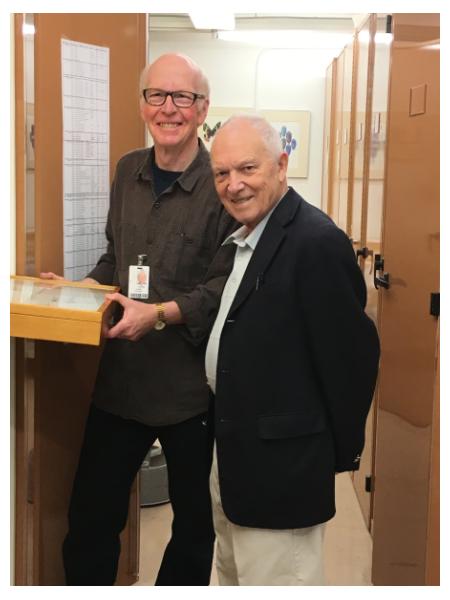
Modernization
Learn more about government’s intention to modernize the museum to protect our historic holdings and provide better access to our collections.
Geoffrey George Edgar Scudder died in Vancouver, BC, on July 4, 2023, after several years of ill-health. He was 89 years old. He was professor emeritus in the Zoology department of the University of British Columbia (UBC) and spent his entire post-graduate university career (1958-1999) there. He is the only UBC faculty member ever to receive all four of the highest honours the university can bestow—The Master Teacher Award (1976), The Killam Research Prize (1989), the President’s Service Award for Excellence (1993), and the UBC Alumni Faculty Citation Award (1997).
Geoff was a giant in the Canadian science museum community. His museum work centred on the Spencer Entomological Collection (SEM) at UBC (now part of the Beaty Biodiversity Museum), where he was director from 1958 to 1999. As he developed the SEM into one of the most important insect collections in Canada, he also helped curate and improve many other insect collections across Canada and the world.

Professor Geoffrey G.E. Scudder, Head of Zoology Department, University of British Columbia (about 1991). Photo: Zoology Department, University of BC.
Geoff’s support of the Royal BC Museum was significant. He had been a museum research associate since 2001. He published numerous scientific papers with RBCM entomologists but, more importantly, his curatorial and collections work was invaluable. Geoff identified to species (a supremely specialized task) more than half of the 8,000 specimens of Hemiptera (True Bugs) in the museum’s collection, many of which he donated himself. He also collected almost 32,000 accessioned specimens of many arthropod groups and many more of his specimens await cataloguing.
Extensive collections from his biodiversity surveys in Okanagan grasslands and Cariboo-Chilcotin saline lakes are deposited in our collections, providing important baseline data for ongoing studies of environmental and faunistic change. In addition, Geoff facilitated the transfer of hundreds of duplicate specimens from the Spencer Entomological Collection to the Royal BC Museum, filling serious gaps in our museum’s holdings.
The Royal BC Museum’s reputation as a centre for entomological collections research was strengthened by Geoff’s impressive credentials and many awards: from the Order of Canada to the Entomological Society of Canada’s Gold Medal, from Fellow of the Royal Society of Canada to recipient of the Bruce Naylor Award for exceptional contributions to museum-based natural history in Canada. When he was presented the last award in 2020, the citation stated: “He has made a brilliant mark on academic life in our nation. But it is the tripartite work of a natural history museum curator and administrator that lies at the heart of his career—field study, collections development and curation; research to expand understanding of the organisms collected and classified; and interpretation, the passing of the knowledge gained to the scientific community and the public.”

Geoff Scudder, Kilpoola Lake grasslands, Osoyoos, BC, 2006. Photo: Robert A. Cannings.
How does one begin to describe the phenomenon that is Geoff Scudder? Superb zoologist, intellectual whirlwind, prodigious writer, forceful speaker. Enthusiastic and supportive teacher and mentor. Relentless researcher, tireless insect collector, curious naturalist. Efficient administrator and organizer. Dedicated conservationist, lobbyist for biological causes, and servant of science.
Geoff published more than 250 refereed papers, 6 books, 12 book chapters, and nearly 100 other publications ranging from symposium papers to book reviews, from internet articles to scientific briefs. The breadth of his biological interests was astounding—from taxonomy and morphology to ecology and physiology, from biogeography and biological diversity to evolutionary theory and conservation biology.
Geoff’s deep understanding of biological diversity, his scientific commitment, and his work in rare and threatened habitats made him a champion in the conservation movement. For many years he served as a director of the Nature Trust of BC, an influential organization buying land for nature conservation. Geoff was active in the development of the Canadian Biodiversity Strategy and the federal Species at Risk Act. He was an enthusiastic public educator—writing, speaking, cajoling—just as effective urging students and naturalists into action as he was convincing politicians and bureaucrats to change policies.
As a university teacher and administrator, Geoff was renowned. He received the UBC Master Teacher Award; his lectures overflowed with un-registered students. He supervised 28 masters students, 10 doctoral students, and 7 post-doctoral fellows. These students went on to careers in natural history museums or are university professors, government researchers, conservation biologists, medical doctors, and teachers. He was an important mentor to many. Geoff took all university life seriously and spent an inordinate amount of time in exhausting administrative work at UBC. He was head of the Zoology department from 1976 to 1991. He served on the Senate from 1978 to 1993, most of this time in the challenging job of chair of the budget committee. Similarly, for most of his time on the executive of the Biology program (1976-1991), he was its chair.
Geoff had a distinguished record of service in science, from the local schoolroom to the world stage. He was a great supporter and promoter of scientific societies and served on dozens, from the Entomological Society of Canada to the Royal Society, from the Biological Survey to the American Association for the Advancement of Science. He sat on advisory committees to Agriculture and Agri-food Canada, the Canadian Space Agency, the Canadian Museum of Nature, Environment Canada, and others. As a member of various granting committees of the Natural Sciences and Engineering Research Council of Canada, Geoff helped dispense resources for biological research.
For Geoff Scudder’s impressive work in its service, the Canadian natural history museum community will always be in his debt.

Geoff Scudder and Rob Cannings, Royal BC Museum, 2017. Photo: Claudia Copley.